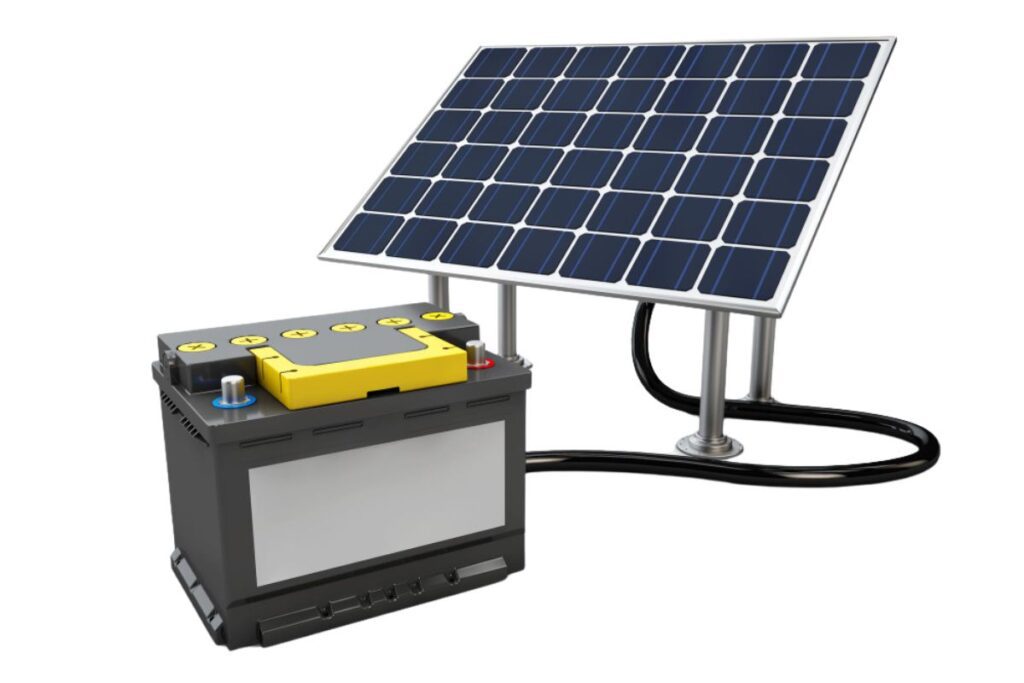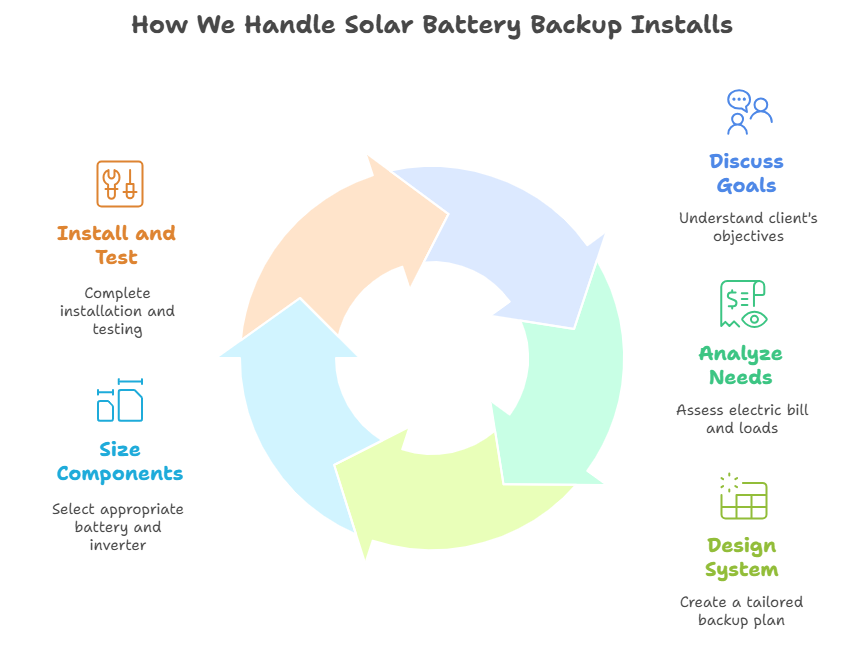Solar battery backup means your solar system charges a battery. That battery powers your home during an outage. Simple enough. But not every solar system includes backup by default. If no battery is installed or it’s installed wrong, your solar shuts off when the grid goes down. People don’t realize that. They find out the hard way.
Solar battery backup is how your home stays powered when the grid goes out. It’s not magic. It’s planning. Capacity, compatibility, and the right installation make or break this stuff.

Why Battery Backup Matters
Power outages are more common than ever, especially with all the storms we get here in Wisconsin. With a backup battery installed, you don’t have to wait for the power company. Your fridge stays cold. Your Wi-Fi keeps running. If you’ve got a sump pump, it won’t sit there dead when the water starts rising.
We’ve had customers tell us battery backup paid for itself in one storm. It’s not about convenience, it’s about being prepared.
When to Install Solar Battery Backup
Install it when you’re installing your solar system. It’s cheaper, cleaner, and better planned from the start. Trying to add a battery later? Doable, but it depends on how your current system was wired. We’ve done retrofits where we had to upgrade the panel, replace the inverter, and rerun the wiring. It works, but it’s more labor, more cost.
If you already have solar and want to add a battery, we’ll take a look. But don’t assume it’s plug-and-play.
How Solar Battery Backup Works
Solar panels produce electricity. That electricity charges a battery. When the grid goes down, your battery kicks on and powers specific loads.
Important: only critical loads, unless you paid for a system sized to handle your whole house. Most people don’t.
Common critical loads:
- Fridge
- Sump pump
- Router
- A few lights
- Furnace fan
If you want to run an AC or an EV charger during an outage, you’ll need more than one battery and solid load management.
Common Mistakes With Solar Battery Backup
1. Assuming solar = backup
It doesn’t. Solar needs a battery and the right inverter setup to provide power during an outage.
2. Choosing the wrong battery size
If you get a battery that’s too small, it’ll run out before the outage ends. We size systems based on your real usage, not guesses.
3. Not separating backup loads
If everything’s on one panel, nothing works right in an outage. You need a critical load panel wired separately.
4. Going with an installer who doesn’t plan it right
We’ve seen setups where the battery was installed but couldn’t power anything because it wasn’t connected correctly.
What Batteries We Recommend
We install Tesla Powerwalls and Enphase IQ Batteries most often. Why? They’re reliable, integrate easily, and are well-supported. But honestly, the brand is less important than the install. A cheap battery that’s installed right will work better than a premium battery slapped in without thought.
How Long Will My Battery Last?
That depends on:
- The battery’s usable capacity (not total)
- What you’re powering
- How much sun do you get during the outage to recharge it
Example: A 13.5 kWh battery with about 12.2 kWh usable can run:
- Fridge: 2 kWh/day
- Lights + Wi-Fi: 1 kWh/day
- Furnace fan: 2 kWh/day
That gives you about 2 days, maybe more with sunlight. But run your AC? You’ll burn it up in an hour or two.
What Happens If You Don’t Size It Right?
Simple. It shuts off early. We’ve seen batteries drain in an hour because the system wasn’t sized for what the customer needed. You don’t want to find out your system is too small during a storm.
We walk every customer through their real usage. Not just “how many panels?” but “what do you want to run, and for how long?”
How We Handle Solar Battery Backup Installs
At Lehmann Electrical & Design, here’s what we do:
- Talk with you about your actual goals
- Look at your electric bill, panel layout, and critical load needs
- Design a system that covers those loads
- Size the battery and inverter correctly
- Handle permits, install, and test

We don’t shortcut this. We install effective solar panels that benefit you, ensuring battery backup with proper inspection. If it’s worth doing, it’s worth doing once, and right. Contact us or visit our office. Get direction.
FAQ
How long will a solar battery last during an outage?
It depends on the usable battery capacity and how much energy your essential appliances use. For most homes, one battery covers 1–2 days of basic loads.
Can I add a battery to an existing solar system?
Yes, but it depends on your system’s current wiring and inverter. Sometimes rewiring is needed for compatibility.
Does solar automatically work during a power outage?
No. You need a battery and the right setup. Without backup equipment, your solar system shuts off with the grid.
